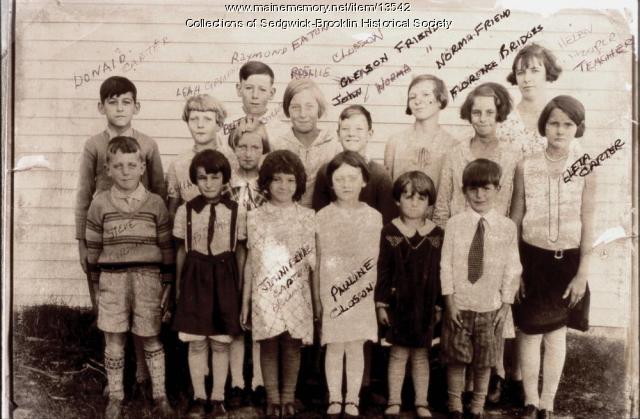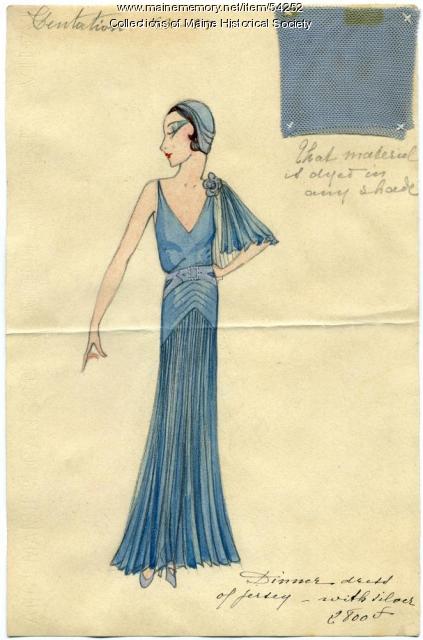Keywords: old school house
- Historical Items (74)
- Tax Records (1)
- Architecture & Landscape (1)
- Online Exhibits (83)
- Site Pages (214)
- My Maine Stories (13)
- Lesson Plans (0)
Online Exhibits
Your results include these online exhibits. You also can view all of the site's exhibits, view a timeline of selected events in Maine History, and learn how to create your own exhibit. See featured exhibits or create your own exhibit
Exhibit
Reading, Writing and 'Rithmetic: Brooklin Schools
When Brooklin, located on the Blue Hill Peninsula, was incorporated in 1849, there were ten school districts and nine one-room school houses. As the years went by, population changes affected the location and number of schools in the area. State requirements began to determine ways that student's education would be handled. Regardless, education of the Brooklin students always remained a high priority for the town.
Exhibit
Public education has been a part of Maine since Euro-American settlement began to stabilize in the early eighteenth century. But not until the end of the nineteenth century was public education really compulsory in Maine.
Exhibit
Women at the turn of the 20th century were increasingly involved in paid work outside the home. For wage-earning women in the Old Port section of Portland, the jobs ranged from canning fish and vegetables to setting type. A study done in 1907 found many women did not earn living wages.
Exhibit
Student Exhibit: Bloomfield Academy
In 1842, the new Bloomfield Academy was constructed in Skowhegan. The new brick building replaced the very first Bloomfield Academy, a small wooden building that had been built in 1814 and served as the high school until 1871. After that, it housed elementary school classes until 1980.
Exhibit
Photographer Elijah Cobb's 1985 portfolio of the Laura E. Richards House, with text by Rosalind Cobb Wiggins and Laura E. Putnam.
Exhibit
Otisfield's One-Room Schoolhouses
Many of the one-room schoolhouses in Otisfield, constructed from 1839 through the early twentieth century, are featured here. The photos, most of which also show teachers and children, were taken between 1898 and 1998.
Exhibit
Home: The Longfellow House & the Emergence of Portland
The Wadsworth-Longfellow house is the oldest building on the Portland peninsula, the first historic site in Maine, a National Historic Landmark, home to three generations of Wadsworth and Longfellow family members -- including the boyhood home of the poet Henry Wadsworth Longfellow. The history of the house and its inhabitants provide a unique view of the growth and changes of Portland -- as well as of the immediate surroundings of the home.
Exhibit
Port of Portland's Custom House and Collectors of Customs
The collector of Portland was the key to federal patronage in Maine, though other ports and towns had collectors. Through the 19th century, the revenue was the major source of Federal Government income. As in Colonial times, the person appointed to head the custom House in Casco Bay was almost always a leading community figure, or a well-connected political personage.
Exhibit
Horace W. Shaylor: Portland Penman
Horace W. Shaylor, a native of Ohio, settled in Portland and turned his focus to handwriting, developing several unique books of handwriting instruction. He also was a talented artist.
Exhibit
Harry Lyon: An Old Sea Dog Takes to the Air
Through a chance meeting, Harry Lyon of Paris Hill became the navigator on the 1928 flight of the Southern Cross, the first trans-Pacific flight. His skill as a navigator, despite his lack of experience, was a key factor on the flight's success.
Exhibit
Westbrook Seminary: Educating Women
Westbrook Seminary, built on Stevens Plain in 1831, was founded to educate young men and young women. Seminaries traditionally were a form of advanced secondary education. Westbrook Seminary served an important function in admitting women students, for whom education was less available in the early and mid nineteenth century.
Exhibit
Evergreens and a Jolly Old Elf
Santa Claus and evergreens have been common December additions to homes, schools, businesses, and other public places to America since the mid nineteenth century. They are two symbols of the Christian holiday of Christmas whose origins are unrelated to the religious meaning of the day.
Exhibit
We Used to be "Normal": A History of F.S.N.S.
Farmington's Normal School -- a teacher-training facility -- opened in 1863 and, over the decades, offered academic programs that included such unique features as domestic and child-care training, and extra-curricular activities from athletics to music and theater.
Exhibit
Student Exhibit: Historic Buildings on Madison Ave in Skowhegan
Take a tour and see some of the beautiful old buildings that used to be on Madison Avenue, Skowhegan? A few still remain, but most have been torn down.
Exhibit
Independence and Challenges: The Life of Hannah Pierce
Hannah Pierce (1788-1873) of West Baldwin, who remained single, was the educated daughter of a moderately wealthy landowner and businessman. She stayed at the family farm throughout her life, operating the farm and her various investments -- always in close touch with her siblings.
Exhibit
In Time and Eternity: Shakers in the Industrial Age
"In Time and Eternity: Maine Shakers in the Industrial Age 1872-1918" is a series of images that depict in detail the Shakers in Maine during a little explored time period of expansion and change.
Exhibit
Home: The Wadsworth-Longfellow House and Portland - The Longfellow Era: 1807-1901
"… 87 of her 90 years in the house she called "dear old home." "[i] am happier here than anywhere. "An affectionate presence seems to enfold me here…A…"
Exhibit
Promoting Rockland Through a Stereopticon, 1875
Frank Crockett and photographer J.P. Armbrust took stereo views of Rockland's downtown, industry, and notable homes in the 1870s as a way to promote tourism to the town.
Exhibit
Dressing Up, Standing Out, Fitting In
Adorning oneself to look one's "best" has varied over time, gender, economic class, and by event. Adornments suggest one's sense of identity and one's intent to stand out or fit in.
Exhibit
MHS in Pictures: exploring our first 200 years
Two years after separating from Massachusetts, Maine leaders—many who were part of the push for statehood—also separated from Massachusetts Historical Society, creating the Maine Historical Society in 1822. The legislation signed on February 5, 1822 positioned MHS as the third-oldest state dedicated historical organization in the nation. The exhibition features MHS's five locations over the institution's two centuries, alongside images of leaders who have steered the organization through pivotal times.
Exhibit
Student Exhibit: The Story of the Heywood Tavern
The story of the Heywood Tavern in Skowhegan.
Exhibit
Cosmopolitan stylings of Mildred and Madeleine Burrage
Born in Portland, sisters Mildred Giddings Burrage (1890-1983) and Madeleine Burrage (1891-1976) were renowned artists and world travelers. Mildred's experiences studying painting in Paris and Italy, and the sisters' trips to Mexico and Guatemala inspired their artwork and shared passions for cosmopolitan and stylish attire. Housed at Maine Historical Society, The Burrage Papers include selections of original advertising drawings called "line sheets" from Parisian fashion houses dating from 1928 to 1936. Images of Madeleine's gemstone jewelry and Mildred's artwork accompany intimate family photographs of the sisters.
Exhibit
Drawing Together: Art of the Longfellows
Henry Wadsworth Longfellow is best know as a poet, but he also was accomplished in drawing and music. He shared his love of drawing with most of his siblings. They all shared the frequent activity of drawing and painting with their children. The extended family included many professional as well as amateur artists, and several architects.
Exhibit
A Town Is Born: South Bristol, 1915
After being part of the town of Bristol for nearly 150 years, residents of South Bristol determined that their interests would be better served by becoming a separate town and they broke away from the large community of Bristol.
























